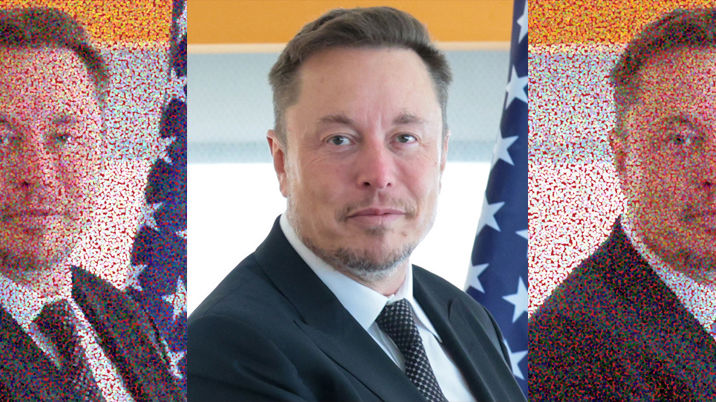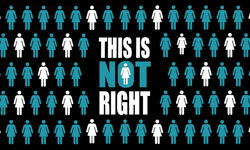
Elon Musk is living proof that you can simultaneously be the world’s richest human, a space rocket pioneer, a Big Tech colossus, the narcissistic owner of a global media influencer and an irresponsible, inflammatory idiot.
Witness the continuing fallout from the X platform tycoon’s role in the riots that have rocked Britain; his ‘inevitable UK civil war’ online rant, his blame-gaming spat with Prime Minister Sir Keir Starmer, his bizarre ‘bromance’ with far right agitprop peddler-in-chief ‘Tommy Robinson’ and his willingness to pump out unchecked misinformation, disinformation and downright deliberate lies no matter the consequences.
No surprise, of course, from a man who lifted the Twitter/X ban on Donald Trump, restored tweeting rights to the convicted criminal and fugitive from justice Robinson and assorted other far right advocates of racism and violence and is now heavily financing Trump’s faltering re-election campaign. From his California holiday ‘retreat’, Rishi Sunak ought to be wincing as footage is mockingly replayed of his own fawning courting of Musk as UK prime minister not so long ago. That November day last year, I almost expected Little Rishi to sit on the Musk lap, gaze adoringly into his eyes while whispering, “Any chance of a job down the line, Elon?”.
Tommy or Stephen?
The paragraph with which I opened this piece was what I told a US broadcast interviewer and since then I’ve argued that, in the case of ‘Tommy Robinson’, it’s time the entire UK media agreed to no longer indulge the publicity addict by using his faux populist patriot pseudonym and only refer to him by his real name of Stephen Yaxley-Lennon.
An August 6th Times leader aptly described him as a “preening extremist who whips up hatred from his Cyprus sunbed and speaks for no decent person”. The fact that his bogus name was chanted by the mindless / misguided morons as they attacked police, mosques, wrecked and looted businesses and torched libraries, food banks and emergency vehicles the overwhelming reason for we in the media not to play Yaxley-Lennon’s dangerous name games. To its credit, the Mail tracked the convicted football hooligan and court skipping runaway to his £400 a night Cyprus holiday berth asking how he could afford it. The answer to that, according to certain security service contacts of mine, is that he’s partly-funded by shady, secretive but wealthy right wing figures in the US rather than the UK. It’s worth noting that initial research shows that over 50% of the initial online fake news about the Southport murder suspect being a Muslim asylum seeker who had arrived by small boat and was on UK spy chiefs’ radar (rather than him being the British-born son of Christian Rwandan refugees active in their local church) emanated from America.
Musk wades in
The grisly ‘bromance’ between SYL and Musk included the tycoon’s online embrace of the former’s ‘Two Tier Kier’ taunt suggesting that UK’s police and prime minister operate different policies toward white citizens and ethnic groups, especially Muslims. It’s a classic far right rallying call disputed by police chiefs, government and the majority of independent assessments. Cheered on by SYL, Musk continued to retweet ‘Two Tier Keir’ ad nauseum before turning his Twitter/X onslaught to the UK’s director of public prosecutions Stephen Parkinson who he branded a ‘woke stasi’. The DPP’s ‘crime’? His public promise to prosecute people who post or report material that includes racial hatred and incitement to violence on social media platforms.
Even looking a fool for retweeting a post by the co-leader of the Britain First party Ashlea Simon called ‘detainment camps’ didn’t deter Musk. The fake post mocked up to look like a story in the Daily Telegraph, suggested Sir Keir Starmer was planning to build ‘detainment camps’ on the Falkland Islands to house arrested right wing protesters. Although it took only 15 minutes for Musk to be alerted to the fakery and for it to be deleted, his repost had already been viewed by almost two million people. (For the record, Musk has a jaw-dropping 193m followers). ‘Utterly dystopian’ was the fitting response of Politics UK editor Josh Self.
For once, the majority of British newspapers and broadcasters were united in condemning the world’s richest man over his ‘Civil war is inevitable in the UK’ posts and his general incendiary meddling in the riot crisis. But, to his undoubted delight, acres of newspaper headlines, TV and radio airtime and phone-in show debates and social media conspiracy theories were devoted to him. Sample the full page Daily Mail article on August 7th by New York-based correspondent Tom Leonard and headlined ‘He’s a genius and a champion of free speech. But when Elon is in ‘demon mode’ he’ll pick a fight with anyone...’.
Now, whatever your views on 53-year-old Musk as a credible ‘champion of free speech’, the Mail article was certainly a warts and all one, but the warts won’t trouble him and all the attention will please him. As requoted by Tom Leonard, Musk’s own brother Kimbal captures him well with “he’s a drama magnet... that’s his compulsion, the theme of his life”. That probably explains, along with his progressive drift to the extreme right politically, why he felt compelled to crash his unwelcome, but headline-grabbing, way into Britain’s riot crisis. Or, perhaps, as Musk’s own biographer Walter Isaacson has put it, “Elon has multiple personalities... some really dark”.
It’s ironic, however, that Musk, the self-described ‘free speech absolutist’ combined his time last week attacking Keir Starmer online with overseeing a planned anti-trust lawsuit against major US advertisers who have deserted X over his increasingly extreme views. (What, no freedom of speech when it comes to deciding where to advertise, eh, Elon?).
For me the best journalistic column on the Musk Effect in recent days came with Janice Turner’s Saturday August 10th Times column headlined “Sorry X, it’s over. Your owner’s a dangerous troll”.
Turner argued: “Musk bought Twitter with the promise of free speech but now he is spreading disinformation and meddling in politics. Elon Musk sits astride Twitter/X as the living embodiment of all that is screwed up and vile about his site. This King of Trolls watched from his redoubt in Boca Chica, Texas, while a community library in Walton was torched, asylum seekers huddled in burning hotels, drunken morons were sucked into violent affray, and locked up for years. It’s mere sport to him, spreading discord, racism, mistrust and division in a tinpot country 5,000 miles away.
“Until now, we’ve never watched a plutocrat go full Bond villain, cackling from his lair as he spreads discord and fear, baiting elected politicians who can only fight his global omnipresence with the feeble weaponry of a democratic state’.
The Guardian’s wonderfully acerbic columnist Marina Hyde is certainly no Elon Musk apologist. But in her August 10th column headlined “Social Media is a problem, Keir, but don’t let it be a distraction”, she took a different tack to her Times counterpart, urging the prime minister to avoid “eyeing Elon Musk as a useful villain” and making social media the post-riot story. Instead, Hyde argued for Starmer to “address the ever- increasing wealth inequality” Labour has inherited from 14 years of Tory government and linking it “to the worst Far Right street violence since the 1970s”. She cited an FT study showing 7 out of the 10 most deprived areas of the country have seen the most violent flare ups to back up her argument.
Whether or not Elon Musk has Janice Turner’s column drawn to his attention is an intriguing question. More intriguing still would be how he’d react to it on X or anywhere else... insulted or flattered by the invective and attention?
Wisely, Keir Starmer has undoubtedly disappointed Musk by declining to respond personally to his taunts and lies, leaving it to Downing Street officials to do the media debunking job, while charging Technology Secretary Peter Kyle to hold a meeting with the UK bosses of TikTok, Meta, Google and X at the height of the rioting.
Online Safety Act
But it was undoubtedly the role of the social media giants — and Musk in particular — in the wake of the rioting sparked by false information online that triggered the prime minister to announce plans for a review of the Online Safety Act, passed under the previous government last October but not due to be enforced until early next year that allows (in theory) the government to fine social media companies up to 10% of global turnover.
It looks inadequate today, given companies would only face a fine if they fail to police illegal content, such as inciting violence or hate speech. Proposed changes could see Ofcom granted special powers to sanction, or even block, platforms if they allow ‘legal but harmful’ content such as misinformation to flourish.
Understandably, some Labour MPs have suggested the government should sever all business use of X/Twitter as a response to Musk’s behaviour. But in a thoughtful piece headlined, ‘Musk tests politicians tolerance for X’, Guardian Deputy Political Editor Jessica Elgot revisited how Keir Starmer had contemplated advocating that when he ran for the leadership in 2020 before realising the pragmatic problems involved. “Politicians, government departments and public figures all use X as their port of call for major announcements”, wrote Elgot before pondering whether Musk’s crisis interference might just provoke a prime ministerial rethink. Personally, I suspect behind the scenes lobbying to try and persuade Musk the Mercurial to tone down his act is the more likely tactic.
Right wing reaction
As the first big test of his premiership, Keir Starmer’s tough, speedy, high profile justice policy with hefty sentences and jail terms (where have all those prison cells come from?) has proved his mettle, drawing heavily on his experiences as DPP and in Northern Ireland. It has also posed a dilemma for his right wing media critics, with titles like the Mail, Telegraph and Express condemning the riots, applauding the tough, fast dispensation of justice on the news pages while reserving their criticism in leaders and op-ed columns for Labour’s perceived ‘lack of an effective immigration policy’. The ailing, failing Express made itself look ridiculous by devoting a whole front page to Nigel Farage’s ideas of a ‘solution’ which cast the Reform leader as a sort of all-seeing, all-knowing sage.
The riots have indeed proved a ‘mixed blessing’ for Farage, blamed by some politicians and commentators for helping to inspire the riots. Perhaps, conscious he’s now the elected leader of a parliamentary party, Farage has been performing a tightrope walk, between condemning the riot violence while mitigating the right to protest over the “immigration disaster” and propagating the “Two Tier Policing” pitch beloved of Musk and “Tommy Robinson”. It guaranteed him plenty of online opportunity and on-air guest time beyond his own GB News studio but also saw him branded a ‘traitor’ by the likes of violence connoisseur Tommy Robinson, Farage’s ex GB News colleague Laurence Fox and other far right agitators now protesting at the severity of the Starmer crackdown.
Farage’s Reform chief whip and GB News colleague Lee Anderson, MP, invited both wrath and mockery by depicting youthful rioters as “young idiots who fell in with the wrong crowd... and we all do daft things when we’re young”.
August 10th also saw Boris break his silence over the riots via his Saturday Daily Mail column by echoing the Farage approach. “Nothing excuses the behaviour of the rioters and they deserve to be banged up. But nothing excuses a government that appears deaf to public concerns,” wrote Johnson in what amounted to a full frontal attack on Keir Starmer over immigration and, sour grapes motivation or not, the former Tory PM eagerly blasted his Labour successor for jettisoning his own treasured Rwanda plan.
By August 10th, King Charles — who had been subject to a degree of media criticism on and offline over not intervening earlier — stepped in with a front page capturing measured statement following remotely-held discussions with Starmer and senior police officers. ‘King hails riot response’ splashed The Times, focusing on the ‘community spirit that countered aggression’. The Telegraph opted for a front page headline ‘King calls for unity in the wake of riots’, reporting the monarch ‘hopes that mutual respect and understanding will unite the nation’. It was an intervention carefully designed to avoid any outright reference to particular extremist groups or individuals or social media platforms but the implication of the monarchical message was clear enough.
By August 12th, Musk was plunged into a new controversy as X faces being axed from Big Tech’s own anti-terror coalition, the Global Internet Forum to Counter Terrorism (GIFCT). Other members include Google, Meta and Microsoft.
The threat followed claims that X is now the top platform for hosting Hamas videos and other terrorist-linked groups' material, according to the Community Security Trust (CST) — an international charity that monitors antisemitism and other forms of extremism.
Twitter was a founder member of the GIFCT but since Musk bought it and renamed it X, investigators say its extremist content rules have been heavily diluted as part of Musk's unrestricted "free speech" boasts with most of Twitter's former moderation team either sacked or redeployed.
Back to where this column began with Elon Musk. Fancifully, a couple of Labour MPs have urged the government to seek his extradition from the US on a charge of inciting a riot in the UK. Fat chance of that. But Labour MPs Chi Onwurah and Dawn Butler, both candidates to chair the Commons science, innovations and technology select committee, told the Politico website that they would pressure Musk and other global Big Tech bosses to appear before it to be questioned about the role of social media platforms in stirring up unrest and violent protests in the UK.
In the past, UK select committees have been snubbed by the likes of Facebook’s Mark Zuckerberg who have sent underlings instead. One source close to Elon Musk tells me he “might really enjoy appearing and speaking his mind to them”, but only after his efforts to help his ally Donald Trump regain the White House in November.
So more a case of tick tock than X, perhaps?
In 2020, Paul Connew contributed to the book, Anti-Social Media?: The Impact on Journalism and Society.












